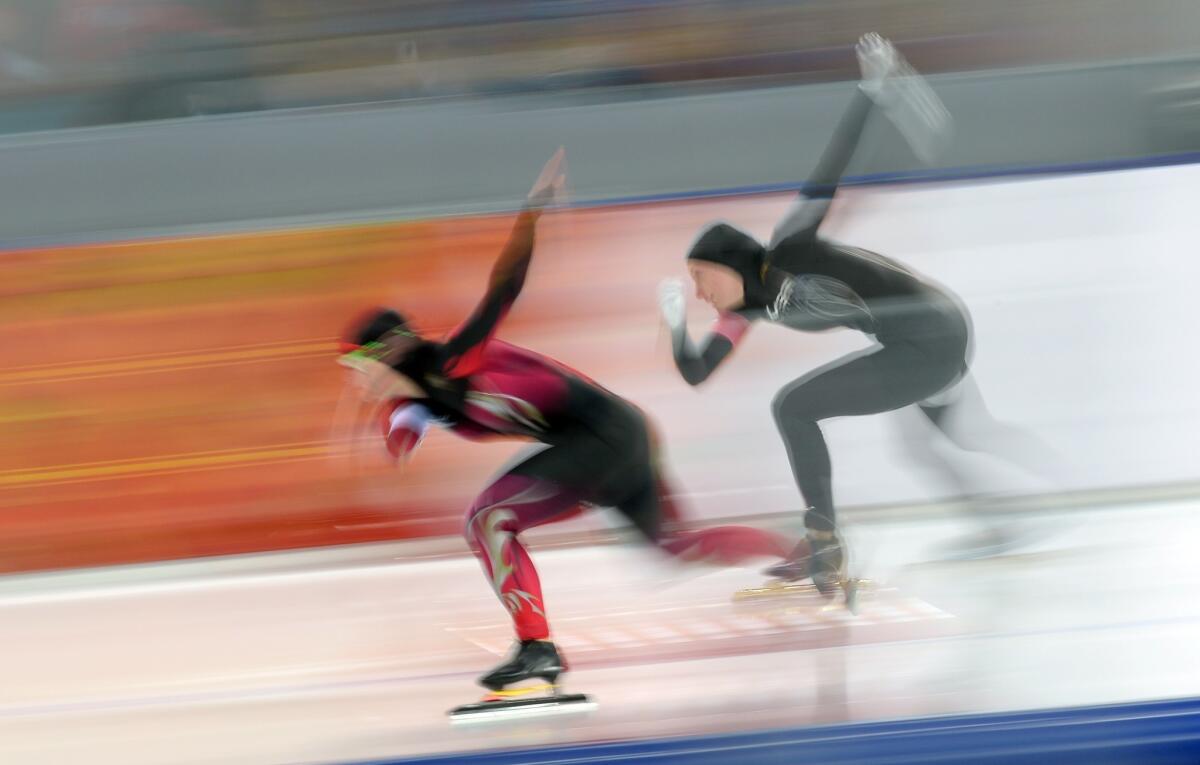Sochi Olympics TV moment: If it’s speed skating, it must be wackiness

- Share via
No athlete likes chaos, but if you’re a certain kind of TV viewer, a competition in disarray is the best kind of competition of all.
In other words, you probably enjoy watching speed skating.
Short track’s alternate name might as well be Chaos on Ice (not to be confused with Chess on Ice, a.k.a. curling). But good old-fashioned long-track can be chaotic too, especially if it’s the shortest of long tracks, the 500 meters. That sport of two long-limbed, full-bodied synthetic outfits on an oval, and screaming fans in orange, saw its own randomness on Monday, as a trio of Dutch men won the three medals, going 1-2-3 in the competition.
Only it wasn’t the order they originally thought they were going. And two of them were brothers. But one of them was a better brother than the other, and then even the better brother.
Sound chaotic yet?
It all went down at the Games’ Adler Arena. If you missed it on the NBC telecast Monday night, here’s what happened. The Dutch, who are long-track specialists but fizzle in the short track, still manage to do pretty well with the shortest of the long-track distances. (Given the close quarters of jostling bikes on Amsterdam streets, you’d think they could do well with the scrum-y nature of short track too, but no matter.)
PHOTOS: Winter Olympics in film
Anyway, it was a big day for the land of Amstel as 500-meter specialist Jan Smeekens won the gold while countrymen Michael Mulder and Ronald Mulder, who are brothers, finished in the second and third positions. There was celebration; there were sibling hugs.
But wait, play-by-play announcer Ted Robinson noted just as the race ended, that the time initially displayed wasn’t official. (In the moment he didn’t explain why, just said that “we talked about the timing system and how it may be adjusted”). When the official time came in a moment later, it turned out that Michael Mulder had beaten Smeekens by 12 thousandths of a second, which, if you’re keeping track at home, is such a small amount that you can’t really keep track of it at home.
RELATED: Is this the weirdest Olympics ever?
Then all hell broke loose. Exultation from Smeekens became confusion, then dejection — it’s still a silver, but hey, he thought he had gold — while Michael Mulder went from mild celebration to exuberant to time-to-go-crazy-ness. As Mulder took his victory lap, it all seemed odd and chaotic and a little conspiratorial. All that was missing with Mulder, really, was Scully.
And it was a great TV moment. Sure, there were no stakes for American viewers. One man in orange who thought he won turned out to lose to another man in orange who thought he lost. But chaos is chaos, and speed-skating never disappoints.
The Americans had more at stake on the short-track circuit, where there was more wackiness. The men’s 1,500 final saw J.R. Celski, the Apolo Ohno-heir-not-so-apparent, leading for a good few laps before overtaken by a Canadian and finishing fourth, another also-ran race in a career, that if this keeps going, will have Celski as a Winter Olympics Susan Lucci.
Then in the women’s heats, Missouri native Emily Scott managed to advance out of the first round for the ladies short-track 500 meters. If her moves were relatively smooth on the ice, the announcers made sure to note the chaos for Scott off the course, cramming in at various points that a)her mother and sister were serving long-running prison sentences for meth trafficking b)her infant brother died when she was a teenager c)to come to Sochi she raised money herself d) she worked part-time in a surgical supply store to generate more cash. It was a litany that set a record for highest ratio of tragic backstory details-to-length of race in Olympics history.
PHOTOS: Sochi Olympics Opening Ceremony
All this was done around Ohno working in some actually analysis. (More later in the Games on him. He’s actually turning into quite a solid commentator; when he says someone will make a pass later in the race, they usually do.)
Sure, it was a day of high drama for Americans elsewhere in Sochi. Julie Mancuso’s sheer exuberance at another medial — this time a bronze in the women’s downhill — made for a great moment. And Erin Hamlin positioned herself to win America’s first-ever luge singles medal with a stellar first two runs, a development you almost may have noticed between NBC commercials. Meanwhile, Bob Costas was downing vodka, possibly making his pink-eye worse.
But that isn’t chaos. Speed skating, now that’s chaos.
[Note: This is part of an ongoing series documenting the Sochi Olympics from a TV perspective. Every morning of the Games, we’ll look at a key moment from the previous day that NBC captured, elevated, honored, bungled or otherwise reported in a notable way, as only the most televised event on the planet can be covered.]
ALSO:
Sochi Olympics TV moment: NBC’s Hannah Kearney challenge
Sochi Olympics: TV makes slopestyle a uniquely 21st-century event
Sochi Olympics: How NBC muffed Bach, Daft Punk (and why it matters)
Follow me on Twitter at https://twitter.com/ZeitchikLAT
More to Read
The complete guide to home viewing
Get Screen Gab for everything about the TV shows and streaming movies everyone’s talking about.
You may occasionally receive promotional content from the Los Angeles Times.







